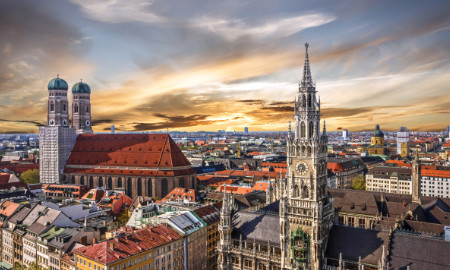Sign up for our free daily newsletter
YOUR PRIVACY - PLEASE READ CAREFULLY DATA PROTECTION STATEMENT
Below we explain how we will communicate with you. We set out how we use your data in our Privacy Policy.
Global City Media, and its associated brands will use the lawful basis of legitimate interests to use
the
contact details you have supplied to contact you regarding our publications, events, training,
reader
research, and other relevant information. We will always give you the option to opt out of our
marketing.
By clicking submit, you confirm that you understand and accept the Terms & Conditions and Privacy Policy
Biopharmaceutical company Celltrion has faced down the threat of a preliminary injunction of its biosmilar drug Omlyclo in an order from the Dusseldorf local division of the Unified Patent Court (UPC).
Novartis and Genentech own patent EP3 805 248 B1 (EP 248) and had accused Celltrion of “imminent infringement” through the promotion of Omlyclo, a biosimilar version of Novartis’s product Xolair used in the treatment of asthma.
But last Friday (6 September) presiding judge Ronny Thomas, judges Bérénice Thom and Alima Zana and technical judge John Petersen rejected their application because the court could not find that Korean-headquartered Celltrion’s conduct already constituted an imminent infringement.
Celltrion’s product Omlyclo contains the antibody omalizumab, the “challenged embodiment”, and is covered by the Novartis and Genentech patent.
The court said that although the challenged embodiment makes use of the technical teaching of EP 248, it “cannot find relevant activities of the defendants which already are actions of infringement or cross the line to imminent infringement”.
Novartis and Genentech argued that the defendants (seven subsidaries of Celltrion) had on various occasions already engaged in conduct which could be considered as an imminent infringement, such as advertising the challenged embodiment at scientific conferences.
The court said it was true that the defendant obtained a marketing authorisation for the challenged embodiment and “clearly promoted” it at an allergy congress at the end of May and beginning of June by displaying on its booth the message “Omlyclo is omalizumab – now approved”.
However, the court said: “This advertising message did not show any specific timeline and there is no specific information that any price negotiations or reimbursement applications by the defendants have already started or are ongoing. Nor is there any specific situation in which samples were actually presented to potential customers.”
Commenting on the decision, Matthew Naylor, European patent attorney and partner at Mewburn Ellis, pointed out that because the court considered that there was no imminent infringement, there was no decision on the likely validity of the patent.
“This is slightly disappointing,” he said, because in the event that the imminent infringement point is overturned on appeal “it will probably be necessary for the case to be sent back to the local division to consider validity before a preliminary injunction is granted, further delaying proceedings”.
In 2022, Celltrion announced that it wished to launch the product in Europe in 2024. Since then it has instigated a mulitpronged attack on the patent, initiating invalidity and revocation proceedings across Europe in its bid to be the first company to supply a Xolair biosimilar to major countries.
In July last year, it commenced proceedings in the UK seeking a declaration that the UK part of the patent was invalid and a declaration of non-infringement. It had also sought revocation of the Dutch part of the patent in the Hague and filed European Patent Office opposition proceedings against EP 248. In a press release in May Celltrion announced that it had European Commission approval of Omlyclo.
In September 2023, Novartis and Genetech filed a counterclaim, seeking among other things an injunction to stop Celltrion infringing the UK part of the patent in suit; that trial is expected to start in October. They have also launched infringement proceedings in the Netherlands.
The defendants were unsuccessful in attacks on the competency of the court and to stay proceedings because of the Dutch action.
Celltrion had argued that the case should be stayed pending the Dutch action. The court disagreed, deciding to rule on the application for provisional measures because different parties were involved and the Dutch case concerned main proceedings, whereas the present case concerned provisional measures.
The court ordered the applicants to pay interim costs of the proceedings of more than €138,000.
The value in dispute is set at €7.5m.
Novartis and Genentech were represented by Freshfields Bruckhaus Deringer partner Frank-Erich Hufnagel in Dusseldorf and principal associate Kilian Seidel, who is based in Munich, alongside UK-based Carpamels & Ransford patent attorney and partner Cameron Marshall and senior associate Joanna Rowley.
Celltrion was represented by a Bird & Bird team led by partners Oliver Jüngst and Marc van Wijngaarden, who are based in Dusseldorf and The Hague respectively.
Email your news and story ideas to: [email protected]










